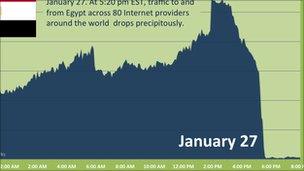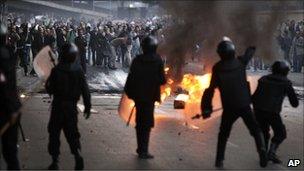Egypt severs internet connection amid growing unrest
- Published

The drop in net traffic in Egypt was dramatic
Internet connections across Egypt have been cut, as authorities geared up for a day of mass protest.
Net analysis firms and web watchers have reported that the vast majority of the country's internet has become unreachable.
The unprecedented crack down has left millions of Egyptians without internet access.
There has been unprecedented protest in the country over the past few days - much of it co-ordinated via the web.
According to internet monitoring firm Renesys, shortly before 2300 GMT on 27 January virtually all routes to Egyptian networks were simultaneously withdrawn from the internet's global routing table.
That meant that virtually all of Egypt's internet addresses were unreachable.
Egyptian authorities are also reported to have stunted net access by shutting down official Domain Name Servers (DNS) in Egypt. These act as address books and are consulted by web browsing software to find out the location of a site a user wants to visit.
Messages circulating in Egypt pointed people towards unofficial DNS servers so they can get back online. Tweets asked those who were online via wi-fi to turn off passwords so anyone can use access.
The Tor Project, which lets people hide where they are online, released statistics showing, external a spike in Egyptian connections to the system.
Mobile services are also affected.
A statement issued by Vodafone Egypt said it had been instructed to suspend services in some areas.
"Under Egyptian legislation the authorities have the right to issue such an order and we are obliged to comply with it," it said.
Khalid Baheyeldin, an open source consultant based in Canada, told BBC News he had been unable to reach his brother in Alexandria via the internet or SMS, but that land lines were still working.
"When I called him, he said that demonstrations are going on since after the noon time weekend prayer," he said.
Unprecedented action
That sudden drop off has been confirmed by other web traffic watchers, including Arbor Networks and BGP Mon.

Riot police have clashed with the anti-government protesters in Egypt
"The government seems to be taking a shotgun approach by ordering ISP's to stop routing all networks," said Andree Toonk, a researcher at BGP Mon.
People and businesses within the country that relied on the four main ISPs have been cut off, external, Renesys' chief technology officer, James Cowie wrote on the company's blog.
"Link Egypt, Vodafone/Raya, Telecom Egypt, Etisalat Misr, and all their customers and partners are, for the moment, off the air," he wrote.
Severing the majority of a country's internet connections represents "is unprecedented in internet history", said Rik Ferguson, a security researcher at Trend Micro.
Domino effect
Earlier this week, Egyptians had reported being unable to access social networks such as Twitter and Facebook. At the time the Egyptian government denied it was behind the block, saying it supported free speech.
Many of the protesters were able to get round those restrictions by using smartphone apps - which had not been blocked - to access those sites.
Others used proxy servers - which divert web traffic to its destination via sites that haven't been blocked.
Those initial restrictions now appear to have been a precursor to a much more stringent communication clamp down.
Elsewhere, unconfirmed reports suggest that mobile users have been blocked from receiving text messages.
But protesters continue to circumvent the net blockade. One Twitter user, @EgyptFreedomNow claimed it is still possible for Egyptians to access the internet, external using dial up connections.
The protests in Egypt followed similar unrest in Tunisia, which saw the collapse of Zine al-Abidine Ben Ali's government.
Amid fears of a domino effect in the Middle East, other regimes are following Egypt's lead in restricting access to some sites.
The Syrian authorities have banned certain programmes that allows access to Facebook's Chat application.
The Egyptian Consulate in London was not answering calls at the time of writing.
- Published28 January 2011
- Published27 January 2011
- Published26 January 2011